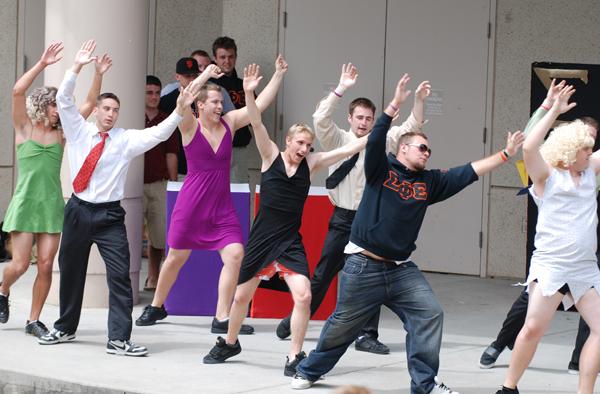Greek Week in need of more involvement

Sigma Phi Epsilon, greek week, price is right theme, greek week winners, friday, stage near union. -Photograph by Derek Adelman:
April 25, 2009
Let the games begin! Sac State will be home once again to Greek Week. Greek Week is a competition that matches the sororities against the sororities and the fraternities against the fraternities. Greek Week is made up of a combination of athletic events, academic contests and a dance competition.
The Interfraternity Council and the National Panhellenic Council will host the annual Greek Week competition. Greek week will start this Friday and continue through May 1. IFC and Panhellenic are Greek councils that act as a governing board to all international and national fraternities and sororities.
Last week The United Sorority and Fraternity Council hosted its Greek Week which is completely separate from the Greek Week that will be starting off Friday. USFC is a Greek council that is there to govern sororities and fraternities that are founded on a cultural interest.
The IFC/Panhellenic Greek Week has been going on since Greek life was established on campus. The USFC Greek Week has only been going on for three years. The councils have decided to keep their Greek Weeks separate rather than combining their efforts to make one colossal Greek Week.
It is a numbers game, said Assistant Director of Student Activities Tom Carroll.
“IFC/Panhellenic Greek week is based on having 50 to 60 members; in the past groups from the USFC before they had their own Greek Week would attempt to participate in Greek Week but they would have 15 members and after two days of events they would just be exhausted,” Carroll said.
Victoria Belasco, senior dance major and member of Sigma Lambda Gamma, agrees with Carroll.
“I can understand when Tom says it’s numbers, because probably like four of our organizations put together is pretty much the same as one organization in Panhellenic,” Belasco said. “It’s really hard because they have bigger numbers than we do.”
Tom Carroll said that IFC and Panhellenic did not want to alter their events to make Greek Week a less physically intense week.
“It was brought to them multiple times to reduce the level of athletic competitions that would then allow a smaller group to participate and survive it, but they were not willing to do that so the USFC decided to create their own Greek Week,” Carroll said.
Karlos Santos-Coy is the campus program advisor of clubs and organizations. He sees a difference between the two Greek Weeks.
“I would say the marked difference is that the IFC/Panhellenic Greek Week is highly based on competition, whereas the USFC Greek Week is primarily focused on building unity,” Santos-Coy said.
The USFC actually hosted a ‘Unity BBQ’ and a ‘Unity mixer’ during its Greek Week.
Belasco does not feel having separate Greek Weeks is excluding anyone.
“It’s not a big deal to me because I know that Panhellenic and IFC is a lot different than USFC, just because of how a lot of our organizations are founded and what we go by, it’s a lot different than Panhellenic,” Belasco said.
David Hine, senior digital media major, is not only the president of his fraternity, Kappa Sigma, but also the IFC Greek Week representative. Hine, with the assistance of Panhellenic Vice President of Greek Week Cheyenne Allmaras, is responsible for coordinating and putting together the week of events.
“It tests the ability of your organization to come together,” Hine said.
Hine said it takes a lot of time and effort for a sorority or fraternity to get together and participate successfully in all the Greek Week activities.
“If a sorority or fraternity isn’t doing well in terms of coming together, it will show,” Hine said.
Allmaras, junior public relations major, is a member of the Sigma Kappa sorority and is also the vice president of Greek activities.
“It is a week where we can take our mind off of things, participate in sports and just be kids again,” Allmaras said. The vice president of Greek activities is one of three elected position on the Panhellenic council.
Allmaras believes that Greek Week is so much more than a competition. “Winning is not the defining factor, all of us would love to be number one and say that we won, but that is not the reason we’re out there. Everyone knows that it’s just a game and the main purpose of it is to raise money to give back,” Almaras said.
Greek week will be returning to an old tradition that will make it a little different from previous years.
“This year, we have brought is back to being a charitable event,” Hine said.
In the past Greek week had raised money for charities, but that has not been the case the past few years.
IFC and Panhellenic have raised about $1,900 by requiring the sororities and fraternities to pay entrance fees.
“This year we are giving our money to Big Brothers Big Sisters out of the Sacramento area,” Allmaras said. Leanna Neves-Bogetti is the program advisor for Student Activities and is new to the position. Neves-Bogetti is a Sac State alumna who was in a sorority when she was here on campus.
“This is my first year working with Greek Week. I know this year they brought back the philanthropies and it was a big priority with Cheyenne,” Neves-Bogetti said.
Greek Week is a competition that has a first, second and third place winner, but Allmaras insists it is more than that.
“It’s competitive yes, but not in the caddy sense of the word,” Allmaras said. “It’s competitive because everyone wants the chance to be ‘top house,’ they want to be first in Greek Week because it is a big honor to be first.”
Hine sees things the same way. He said that when an organization wins Greek Week, it gets bragging rights for the whole year.
“Greek Week shows who is top dog on campus in terms of brotherhood or sisterhood,” Hine said.
Jacqui Alfaro, junior deaf studies major, thinks it’s OK if something is a competition and prefers to just call it what it is.
“It’s kind of like any other competition…obviously you are going to compete if you want to be one of the top people,” Alfaro said.
The sororities and fraternities will be competing in flag football, softball, soccer, volleyball and parlor games that include pool and darts, a chariot race, potato sack races, wheelbarrow races and a college bowl, which is an academic competition. The week will conclude with Greek sing, a dance competition.
Greek sing is an open form dance competition where all organizations choose a theme and put together a number that best expresses that theme.
As of now, the only members of the campus community who come out to support Greek Week events are active members of the Greek system and alumni.
“We try to get everybody out as much as we possibly can, like friends of friends,” Allmaras said. “But not a lot of people would want to come and watch because it is an all day event.”
Allmaras said she would like to see more of the campus community out at the events, so they can see what it’s like.
“It’s a laid back way to get your mind off of school and it is stress relieving,” Allmaras said. “It is always nice to have other people out there because they can give us ideas on how to involve the outside community or maybe how to better it next year.”
Greek Week events are, however, not advertised to the campus community.
“It’s not advertised because people wouldn’t understand, it takes a lot of time to sit down and explain what Greek Week is,” Allmaras said. “We don’t want people to feel excluded but we don’t want people to feel uncomfortable either.”
Alfaro has been on campus for three years and in that time, she has not heard of Greek Week.
“If I had known about it, I might stop by just to see what it’s like in between classes,” Alfaro said. “But if they are going to be like, ‘Well you are not going to get it anyways so don’t worry about it’ then obviously I’m not going to come. If that is their attitude, then they’re making me feel inferior already because I don’t know about Greek Week.”
Gensis Bell, freshman dance major, disagrees with Allmaras.
“I don’t know much about Greek Week, but I think they should include everyone regardless if they think people will feel overwhelmed,” Bell said.
Kathleen Pane, senior history major, is not in a sorority but she really supports them because she has a lot of friends who are in them.
“I think not talking about it or inviting people and letting people know what it is will feed into the negative aspect of Greek life.”
Pane feels that including the campus in Greek Week will not only better the Greek system here, but will also create a more cohesive and fun campus environment.
“If they were to included (outside) people I think it would add to the college feel. Making Greek Week open to all students could only help non-Greek students to understand more of what they do besides the stereotypes they hear.”
Greek Week is not advertised to the campus. “What (sororities and fraternities) do is only interesting to them,” Carroll said. “Greek sing is only interesting to people involved in a fraternity or a sorority and they have always had a problem getting repeat judges because it is just not that interesting.”
Santos-Coy hopes that Greek Week can continue to fulfill what students want.
“We don’t decide what Greek Week is or is not, the students who coordinate it do. As long as the students can look back at last year’s Greek Week and ask ‘how can we make it better?’ and then try to come up with ways to fulfill that, then every year will be the best week ever,” Santos-Coy said.
Cozette Roberts can be reached at [email protected]






















































































































